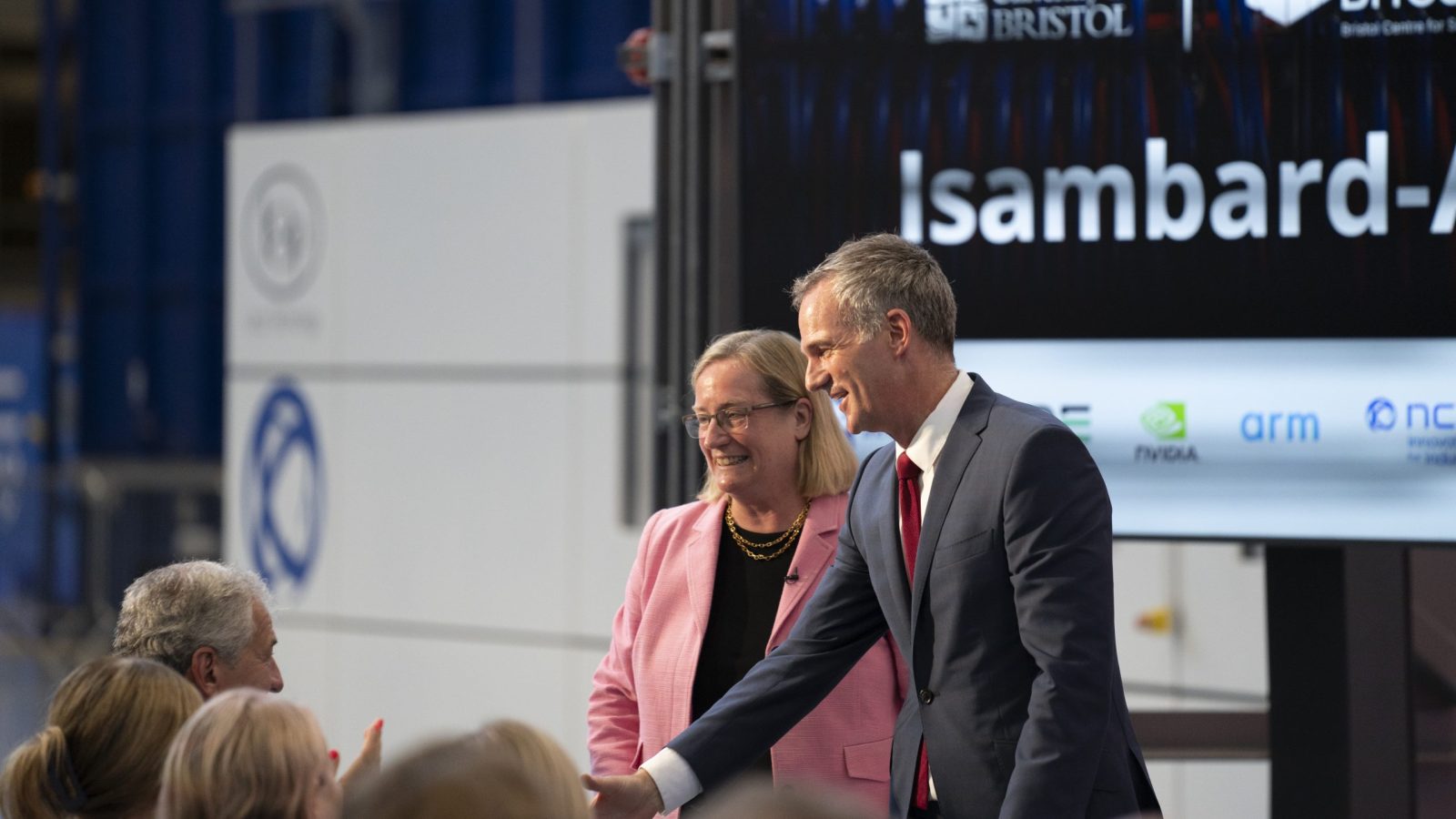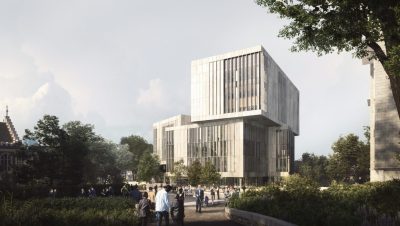News / Isambard-AI
Launch of UK’s fastest supercomputer promises new age of innovation
The Victorian engineer Isambard Kingdom Brunel, mastermind behind the Clifton Suspension Bridge, the SS Great Britain and the Great Western Railway, put Bristol firmly on the map of innovation, sparking a renaissance in engineering.
Fast forward two centuries. A new chapter of innovation is on the horizon with the launch of the supercomputer bearing his name – Isambard-AI, that promises to usher in a new era of tech, not just for the West Country, but for the whole UK, already drawing together leading figures from science, technology, health and humanities.
UK’s fastest supercomputer, Isambard AI, was officially launched on Thursday at National Composites Centre (NCC) at Emersons Green with the attendance of members of the academia, investors and political leaders.
is needed now More than ever
The £225m supercomputer, hosted and facilitated by the University of Bristol, has been overseen by Professor Simon McIntosh-Smith, director of Bristol Centre for Supercomputing (BriCS), from its original conception, alongside dozens of industry experts and academics.

Peter Kyle, secretary of state for science, innovation and technology, officially launched Isambard-AI – photo: University of Bristol
The fastest in the UK by a comfortable margin, it already ranks among the top ten supercomputers in the world, making its entrance into the field of AI.
It is nothing short of stupefying to think that the current site of Isambard AI was a car park just over a year ago, but in a rare moment of alignment of all stakeholders, Isambard-AI was ready for its official launch in quick time.
The site was built by the Bristol-based firm Oakland Construction, which adopted innovative building methods that significantly reduced both construction time and carbon footprint, making it the second greenest supercomputer in the world.
The secretary of state for science, innovation and technology, Peter Kyle, officially launched the supercomputer during his visit to the National Composites Centre.
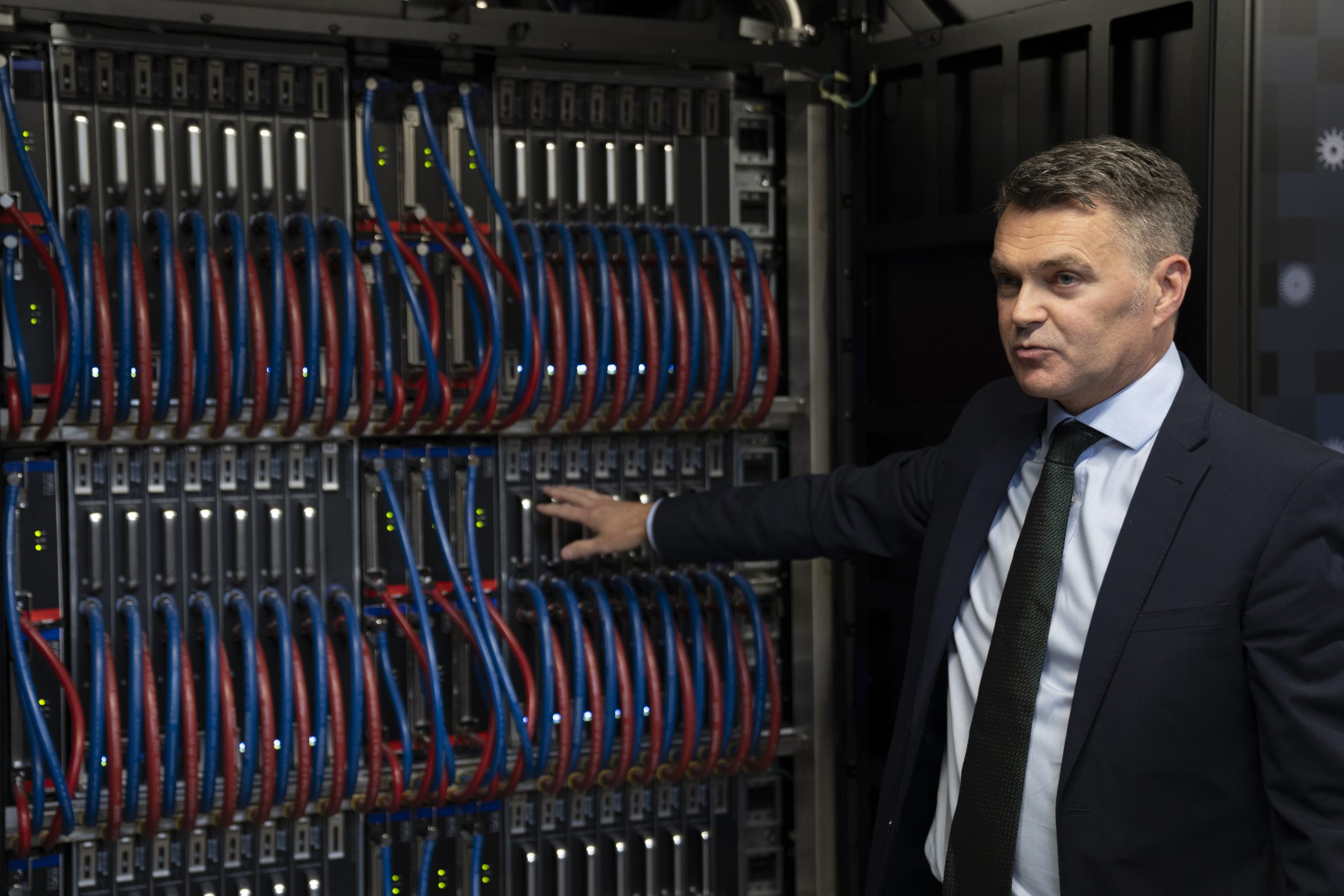
Professor Simon McIntosh-Smith, professor of high performance computing at the University of Bristol and Isambard-AI project lead, demonstrating Isambard-AI – photo: University of Bristol
Isambard-AI supercomputer is already being put to work on a range of socially significant projects, ranging from predicting crowd movements using wearable camera footage to detecting early infections in farm animals through behavioural analysis and clean energy.
In the healthcare space, researchers are using Isambard-AI’s vast processing power to uncover racial bias in skin cancer detection apps, aiming to improve diagnostic fairness.
Speaking to Bristol24/7, secretary Kyle said: “This afternoon, we’ll be pressing the button to power up Britain’s largest supercomputer. And it’s not just any supercomputer — this one is dedicated to serving the public good.
“Already, scientific organisations are preparing to use it to process data related to a particularly aggressive and challenging form of cancer. This has the potential to accelerate solutions to some of the most pressing issues we face — improving the health of individuals and the nation as a whole.
“It could also boost our economic prosperity by giving local businesses access to world-leading computing power. In doing so, it supports the kind of growth our economy urgently needs. And the most exciting part? It’s all happening right here in Bristol.”
He continued: “Today, I’m also launching Britain’s new compute strategy — because we want to increase our sovereign computing capacity, our ability to process data and run advanced experiments, by a factor of 20 by 2030.
“This means businesses can turn innovation into real-world impact — moving ideas off the drawing board and into the economy. It also means world-leading technologies developed right here in Britain, and breakthroughs in science and medicine that would have seemed unthinkable just a few years ago.”
Part of the UK government’s £2bn drive for ‘AI sovereignty’, the facility enables British researchers to train advanced models without relying on overseas infrastructure. The launch aligns with prime minister Keir Starmer’s speech earlier this year, in which he outlined his ambition to make the UK an ‘AI superpower’.
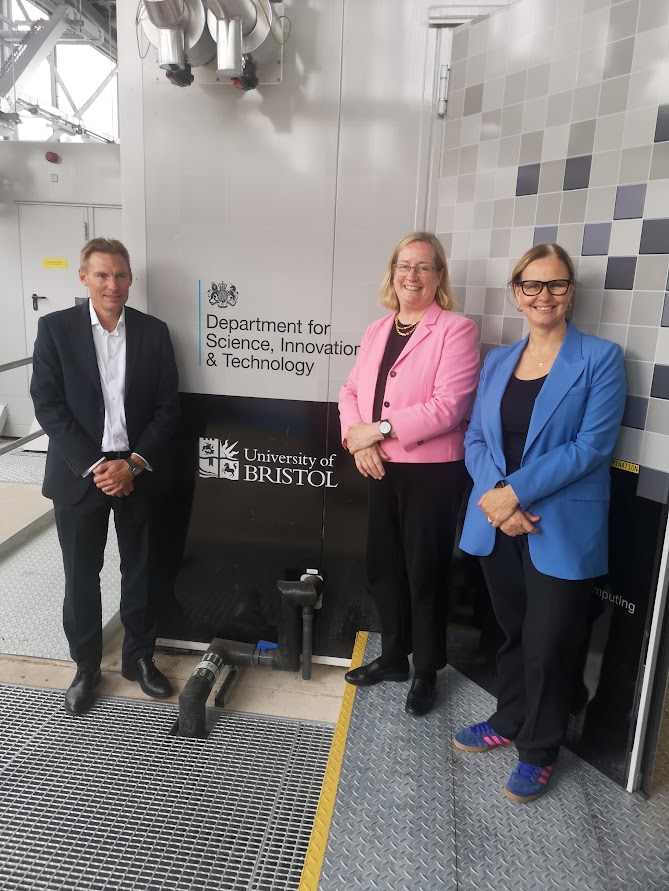
Professor Evelyn Welch, vice-chancellor at the University of Bristol; Helen Godwin (r), mayor of West of England and Professor Richard Oldfield, chief executive at UK National Composites Centre, during the launch of Isambard-AI – photo: Milan Perera
Speaking on the much-awaited launch of Isambard AI, Professor Evelyn Welch, vice-chancellor at the University of Bristol, said: “This is The supercomputer, not just for Bristol and the West of England, but for the whole nation. And indeed, it sets an example for the whole world.
“We are incredibly proud of what it is, but also what it can do, what it can do for people in their everyday lives, as well as for research and innovation. We’re really excited.”
“Isambard-AI will be the fastest supercomputer in the UK — and one of the fastest in all of Europe. It’s based at the National Composites Centre, which for over a decade has been translating research ideas into practical business solutions, particularly in advanced manufacturing.”
Powered by more than 5,400 NVIDIA GH200 Grace Hopper ‘superchips’ delivered in collaboration with HPE, Isambard-AI is now up and running as applications are now open for researchers, academia and SMEs to use it.
Professor Richard Oldfield, chief executive at UK National Composites Centre, elaborated: “Quite simply, Isambard-AI has the potential to transform products across every sector and at every stage of the product life cycle — from design and manufacturing to end use. This is science with real-world impact, and that’s exactly what we’re doing here.
“We’re absolutely thrilled that it’s based at the National Composites Centre, because it allows us to pull through world-class research from universities and translate it directly into industrial impact.
“What’s even more exciting is the cross-sector potential. Innovations developed for healthcare can be applied in engineering, and vice versa. It’s truly transformational — and we’re incredibly proud to have it here in the West of England.”
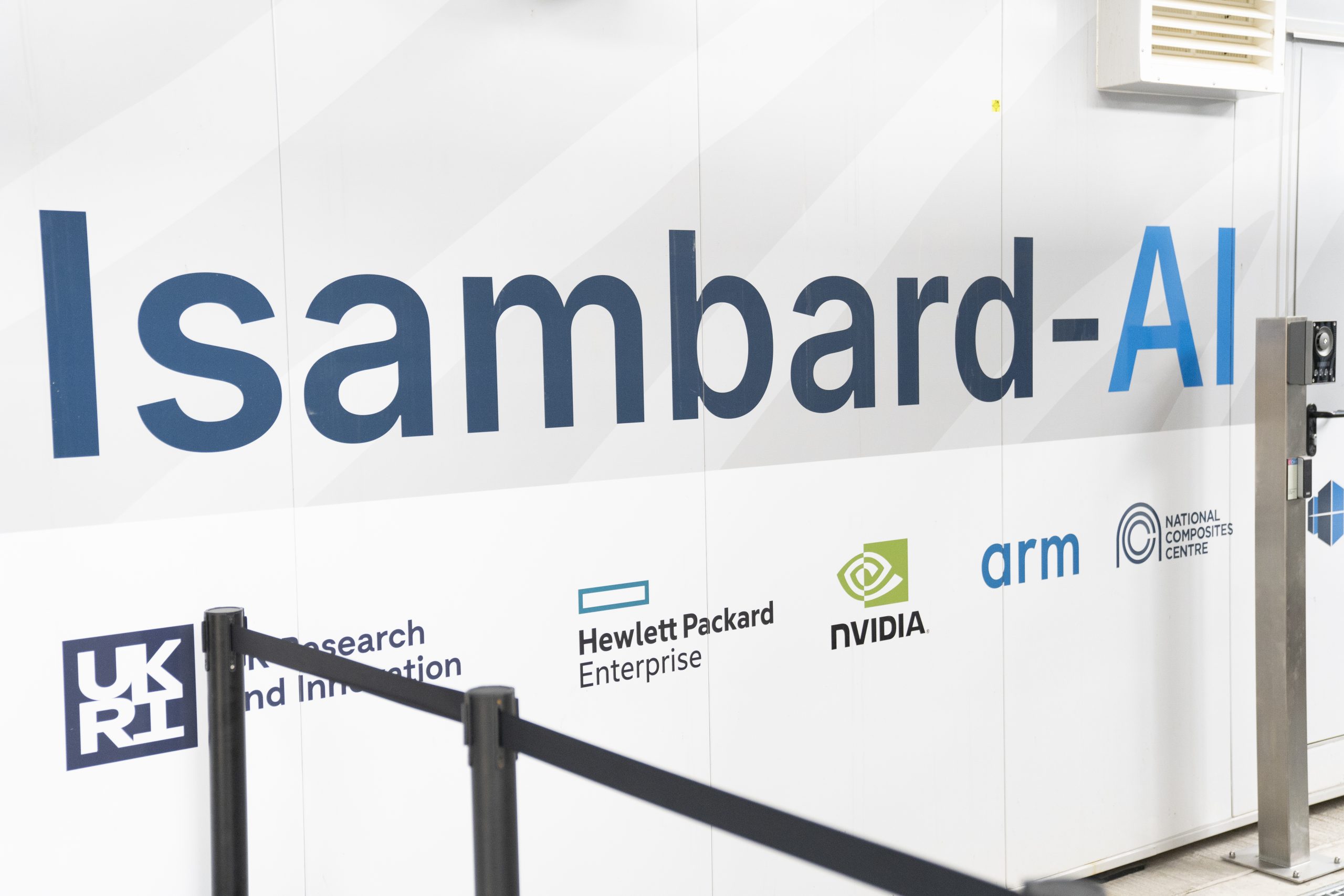
Isambard-Ai is the result of several partners working with a shared vision – photo: University of Bristol
The event was attended by local politicians from both local authorities and Westminster. Among them were Helen Godwin, mayor of the West of England; Tony Dyer, leader of Bristol City Council; Kerry McCarthy, MP for Bristol East; and Claire Hazelgrove, MP for Filton and Bradley Stoke, the constituency where the supercomputer sits.
Hazelgrove welcomed the new chapter of innovation pioneered from Isambard-AI. She said: “It was fantastic to welcome the secretary of state to the NCC in Emersons Green to switch on Isambard-AI – one of the most powerful and sustainable supercomputers in the world.
“Isambard will transform research and help save and change lives, driving medical and climate innovation, and more. Our community is home to excellent researchers, engineers and innovators and I’m proud that we’re now home to Isambard, too.”
Speaking to Bristol24/7, Helen Godwin, mayor for the West of England, said: “This isn’t just about what’s happening here in South Gloucestershire or the West of England — it’s about what we’re contributing to the whole country by having this incredible facility here.
At the same time, it’s hugely important for us in the West Country as we continue to tell our story and shape our future. We’ve been very clear that digital, tech and AI are vital to our region’s economic growth — alongside advanced manufacturing.
“But it’s also about creating the right environment — a fertile ground for innovation — where people feel supported to bring forward great ideas and inventions. Our region can be the foundation for that continued growth.
“It’s crucial that people see real benefits from this — that they feel it’s improving their lives. And alongside that, we must think about how we’re training our young people and working-age adults, so they can access the opportunities this technology brings in terms of future employment.”
Tony Dyer, leader of Bristol City Council, welcomed the launch of the supercomputer and highlighted the positive impact it will have on everyday applications and how it could enhance people’s lives.
He said: “One of the things this allows us to do, particularly working with our partners at the universities and the National Composite Centre, is run different scenarios. For example, we might want to assess the impact of changes in traffic flows.
“What the supercomputer allows us to do is quickly run through these different scenarios and provide output in a fraction of the time it used to take — sometimes 100 or even 1,000 times faster. This means we can make decisions that affect people’s lives more quickly and effectively, while also ensuring we avoid making choices that disrupt their lives unnecessarily.”
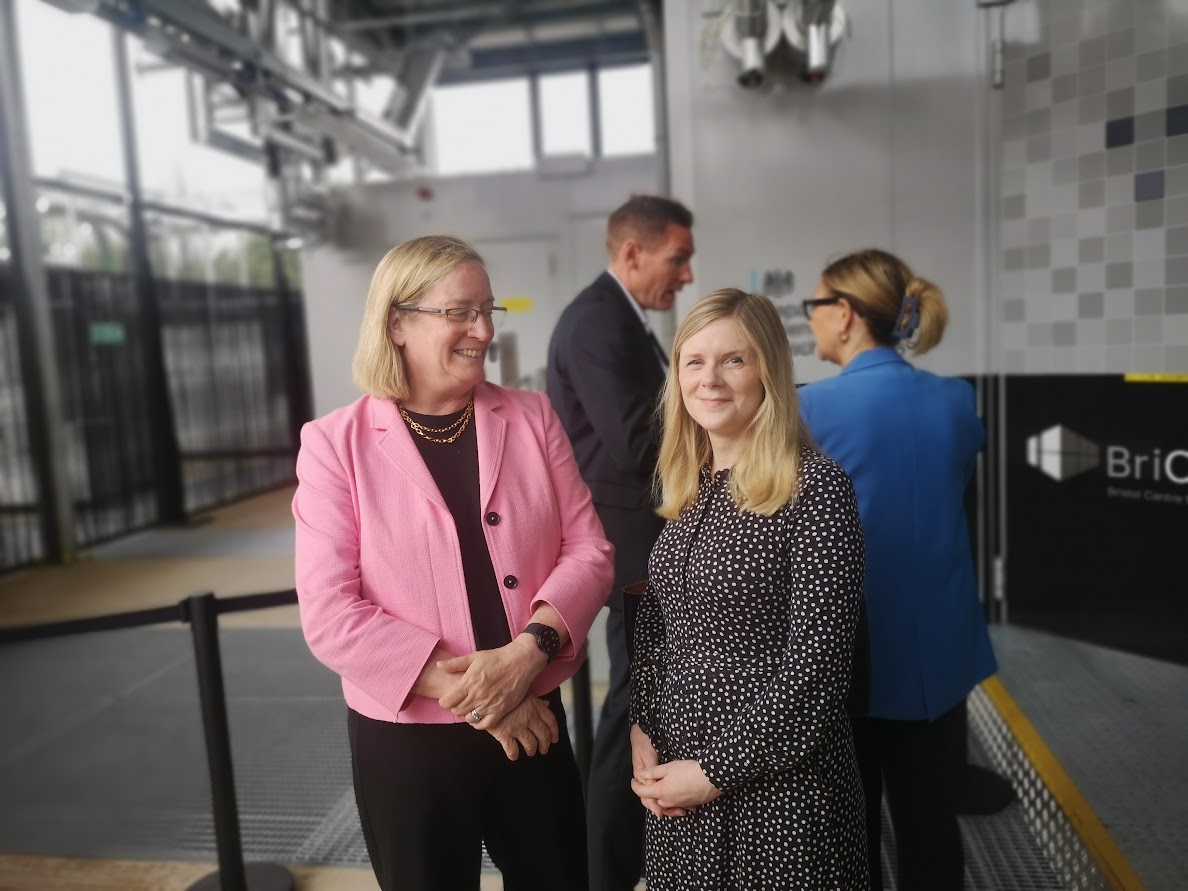
Among the local politicians attended the launch was Claire Hazelgrove, MP for Filton and Bradley Stoke – photo: Milan Perera
The event was graced by the presence of researchers from universities around the country. Among them was Professor Darren Reynolds, pro vice-chancellor for research and knowledge exchange at UWE Bristol, who welcomed the potential opportunities to collaborate and exchange with the launch of Isambard-AI.
He said: “An investment of this kind, valued at around £230m, has the potential to radically transform and provide a step change in how we undertake many computational tasks. To put it into perspective, we all have computers in our homes, but this supercomputer is like gathering all the computers across the UK—and perhaps beyond—and focusing their power on a wide range of activities.
“AI and high-performance computing like this are being extensively used in fields such as medicine, the environment, and materials science.
“For example, in protein discovery—which is crucial for advancing research into antimicrobials and diseases—this kind of computing power can greatly accelerate progress. The breakthroughs that will emerge across engineering, life sciences, material sciences, and even societal applications become much more imaginable.”
Researchers at University College London are already using Isambard-AI to develop pioneering AI tools that could significantly improve NHS cancer screening. Using prostate cancer as the initial test case, they are harnessing the system to create one of the first scalable AI models dedicated to medical imaging. These tools could soon be rolled out across the NHS, transforming outcomes for patients with a range of conditions.
After the official launch followed by a Q&A session, attendees were given a guided tour of the site as it is officially open for business.
Main photo: University of Bristol
Read next:
 Our newsletters emailed directly to you
Our newsletters emailed directly to you